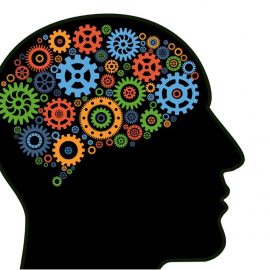

This article gives you a glimpse of what you can learn with Shortform. Shortform has the world’s best guides to 1000+ nonfiction books, plus other resources to help you accelerate your learning.
Want to learn faster and get smarter? Sign up for a free trial here .
Where do self-serving behaviors come from? Are humans selfish by nature?
Many people believe that humans are hardwired to be selfish, and there’s scientific evidence to back that up. But just because we’re born with an innate desire to serve ourselves, that doesn’t mean we have to live a completely selfish life.
Keep reading to learn where selfishness comes from and how we can rise from it.
Selfishness on a Genetic Level
The Selfish Gene by Richard Dawkins explains that all behaviors in nature lead back to genes trying to copy themselves. Selfishness and altruism can both be explained by animals acting to protect either themselves or their relatives (who will, by definition, share many of their genes).
Emperor penguins demonstrate selfish behavior when they push each other into the water to check for predators before diving in themselves. Meanwhile, bees demonstrate altruistic behavior when they sting to defend their hives—while they may drive off creatures that would have eaten the hive’s food source, the honey, the bees themselves often die in the process.
However, selfishness and altruism aren’t always immediate life-or-death acts. For example, a bird that gives an alarm call upon seeing a predator is being altruistic, because the bird might draw that predator’s attention to itself. It’s a relatively small risk compared to that of a bee stinging an intruder, but it still counts as altruism.
It must be understood that the gene is the unit of inheritance—not the creature, species, or population. Therefore, humans are selfish by nature because it’s rooted in gene selfishness.
Animals, including humans, are essentially organic machines built by genes, and genes are designed to survive and reproduce. Genes are selfish—not consciously, of course, but those that still exist have out-competed countless other genes. This is ultimately selfish behavior—that is, behavior that benefits the individual at the expense of others.
Kin Altruism
According to Dawkins’s other book The God Delusion, taking care of your children and ensuring that they grow up strong and healthy enough to have children of their own is one of the best ways to ensure the survival of your own genes. It is easy to see then why natural selection would favor kin altruism as a replicating behavior through generations. And sure enough, kin altruism—caring for those with whom one shares a genetic link—is widely seen not just in humans, but throughout the animal kingdom.
- To give an extreme example, if an organism could save more than two of its siblings or children by sacrificing its own life, selfish gene theory dictates that it should do so. Genes don’t need one particular organism to survive, as long as organisms likely to be carrying them can keep reproducing.
Genes also show their selfishness because altruism toward outside groups is rare, and toward different species is almost unheard of. For example, a human killing another human is one of the worst crimes possible, but we kill animals every day for food, in self-defense, or simply for sport.
Are We Altruistic for Ulterior Motives?
Humans are something of a special case when it comes to selfishness and altruism. Unlike other animals, we can be taught altruism and be convinced to go against our basic selfish nature—although to exactly what extent is part of the ongoing nature vs. nurture debate.
Below we’ll look at two arguments for whether humans are selfish by nature, and whether we are altruistic for ulterior motives.
Being Altruistic for Happiness
Reciprocity—the phenomenon by which we treat others as we have been treated by them—is one of the strongest ties that bind society together.
Kin altruism is the mechanism by which individuals care for and protect individuals within their kin group (those with whom they share a blood relation). It’s observed in the behavior of many non-human animals and can be explained by simple Darwinian instincts: if the ultimate goal is to ensure the survival of one’s genes, it makes sense to be altruistic toward other members of the kin group.
But this does not fully explain the human phenomenon of reciprocity as we observe it. Humans, unlike other animals, work with, care for, and protect people with whom they have minimal or no blood relation. If anything, such behavior cuts against Darwinian impulse, as these other people are our “competitors” for scarce resources and their survival could be construed as hampering our own. Clearly, something else is going on.
What separates us from these other animals is the reciprocity reflex, according to Jonathan Haidt’s book The Happiness Hypothesis. This tells us to repay others when they do something for us. It’s so deeply ingrained that we hardly think about it, yet we practice it all the time. When a friend treats you to lunch, you make sure you pick up the check the next time you go out. When your neighbors invite you to a party, you invite them the next time you’re hosting an event.
We have the instinct to repay favors, even from strangers. From an evolutionary perspective, it works because it increases everyone’s chances of survival. The reciprocity reflex causes the other members of the group to help you if you have helped them, creating networks of mutual obligation.
This reflex is supported by two emotional sub-reflexes—gratitude and vengeance. Gratitude causes us to aid those who’ve aided us in the past; vengeance causes us to withhold aid from those who’ve been stingy or selfish, making it less likely that free riders will exploit the community’s altruism. This opens up the possibility of mutually beneficial cooperation, which makes the group as a whole stronger and strengthens social ties between members of a community.
Self-Sacrifice
Will self-sacrifice for others also be self-rewarding? To answer that, we should briefly look at the two main explanations for why humans engage in altruistic behavior.
- The first has its roots in evolution—your genes are more likely to survive if you’re altruistic toward people in your kin group. Reciprocity is also important, as others will respond to your self-sacrifice on their behalf by returning the favor for you.
- The second explanation is religious, namely, that you’ll be rewarded in the afterlife or in your next life by being altruistic (think of the Judeo-Christian concept of heaven and hell or the Hindu idea of karma).
But these do not fully explain the altruistic behavior we see. We often act altruistically even when there is no chance of reciprocity or direct benefit for ourselves, including people who don’t believe in an afterlife. Something else must be at work. Altruism must provide us with more intrinsic benefits.
And studies have shown that engaging in altruistic behavior does lead to an increase in all measures of happiness. This is especially true for older adults. Because they are lonelier and have reduced social networks, altruism widens their circle and gives them new sources of comfort, as well as purpose.
Thus, while morality certainly encompasses far more than just altruism, we should not take that to mean that we shouldn’t be altruistic. By doing good for others, we are doing good for ourselves.
We Can be “Groupish” as Well as Selfish
The Happiness Hypothesis suggests that we act altruistically because humans are selfish by nature and want to feel good about altruistic acts. While that’s true sometimes, Haidt’s other book The Righteous Mind and Richard Dawkins’s The God Delusion prove that we can grow beyond the selfishness we’re born with.
We are hardwired to repay favors, even from strangers. From an evolutionary perspective, it makes sense because it increases everyone’s chances of survival. The reciprocity reflex causes the other members of your tribe to help you if you have helped them, creating networks of mutual obligation.
Reciprocity is key to the social glue that holds societies together. Especially in early human societies, which would have been small, tight-knit bands of mostly kin, it would be advantageous to cultivate a reputation as being trustworthy and reciprocal. Likewise, it would have been disadvantageous to cultivate a reputation as a selfish free rider—because no one would be willing to help you in your time of need.
Darwin argued there are multiple reasons why humans first banded together:
- First, we developed social instincts: Predators targeted loners more often than people who stayed close to the group.
- Second, we discovered reciprocity: People who helped others were helped in return.
- Third and most importantly, we developed a desire for social approval: People are concerned with what other people think of them and eager to find praise and avoid blame. People who lacked these traits were selected against because they couldn’t find mates or even friends.
It’s clear based on the way that we evolved that in practice in actual armies, the coward will not be the one most likely to return home, he’ll be the one most likely to be left behind and picked off. If he does manage to make it back, his traits will be repulsive to finding a mate. This builds on itself, so every time a group selects for loyal people, the next generation will share that trait even more widely.
Evidence of Groupishness
Clearly, it’s not true that self-interest is the source of every behavior. People donate anonymously to charities or put themselves in harm’s way to save people they don’t know. Even if humans are selfish by nature, we’re not like most other animals: We can occasionally act selfless because we’re taught to be.
Consider the response in America to the 9/11 attacks: People drove hundreds of miles to New York in the days following to see if they could help dig people out of the wreckage. Many donated blood or signed up for military service. An event spurred most people in the country to think in a groupish manner.
Experts are still divided on whether actions like rallying around the flag after a national tragedy are groupish activities or are selfish ones that just manifest differently than usual. Here are four examples that prove the former point right:
- Evolutionary Transitions: Biologists see eight clear examples of major evolutionary transitions in the last 4 billion years (from single-celled to multi-celled organisms, and so on). The final transition is the development of human societies. These eight transitions are probably the most important events in history. And they all move in the same direction—when individual units find ways to cooperate, selection at the higher level becomes more important and favors cohesive “superorganisms,” or groups that can work together for success. Then these superorganisms begin to compete with one another and evolve for greater success, bringing about more groups.
- Same Interests: One of the human conditions that distinguishes us from other primates is called shared intentionality. At some point in our evolution, we learned that we would do better if we split up tasks: One person holds a branch of a tree down, another picks the fruit, and the two eat the fruit together. Natural selection then favored more “group-mindedness.”
- Coevolution: Coevolution is the process by which species affect each other’s natural selection. Humans evolved to work together because other species were evolving to work together better as well. As part of their coevolution, humans developed shared intentionality to hunt together and share their resources. Humans also learned to domesticate animals in a group. Groups were forced to work together to keep cattle alive, which in turn helped them to win competitions with rival groups. A more group-friendly nature developed due to coevolution and replaced our more primal, selfish one, which has greatly influenced our ideas about what’s moral and what isn’t.
- Quick Evolution: We have data from the Human Genome Project that genetic evolution in humans has accelerated significantly in the last 50,000 years. Genetic evolution in the Holocene era, which started about 12,000 years ago, shows that humans were suddenly exposed to new foods, climates, people, predators, and forms of warfare and social structures. This led to a population rise and much more gene mutation. If genetic evolution can be this fast, it’s possible human nature can change in a few thousand years as well.
Conclusion
Are humans selfish by nature? Yes, we are. We want to protect ourselves and sometimes we cooperate with others for our own happiness or material benefits. Yet, there’s reason to believe we can rise from this selfishness. If taught and raised well, humans can be altruistic beings that are only selfish from time to time.
What is your view on the nature of human selfishness? Let us know in the comments below!

Want to fast-track your learning? With Shortform, you’ll gain insights you won't find anywhere else .
Here's what you’ll get when you sign up for Shortform :
- Complicated ideas explained in simple and concise ways
- Smart analysis that connects what you’re reading to other key concepts
- Writing with zero fluff because we know how important your time is






